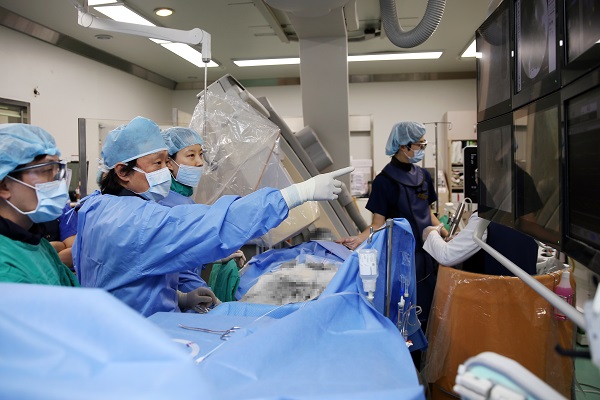A cardiology team led by Professor Yu Cheol-woong from Korea University Hospital (KUH) has completed Korea’s first transcatheter mitral valve implantation (TMVI) in a patient with postoperative mitral stenosis complications without resorting to a surgical process.

Mitral stenosis is a disease in which the mitral valve of the heart does not open well and narrows.
“The procedure’s success is significant because it demonstrates the possibility of performing TMVIs for not only aortic valve regurgitation but also mitral regurgitation, mitral stenosis, and aortic valve stenosis,” KUH said.
The 81-year old patient underwent mitral valve replacement surgery due to severe mitral stenosis in 2010. However, after the operation, the mitral stenosis progressed to severe mitral stenosis and pulmonary hypertension.
Although the patient underwent a percutaneous balloon dilatation of the mitral valve, the patient experienced severe breathing difficulties that made day-to-day tasks and sleep difficult. Symptoms did not improve with medication. Re-operating on the patient was considered dangerous considering the previous treatment history, the patient’s age, and other risk factors.
Professor Yu decided to try a TMVI to insert a prosthetic valve as a last resort – an operation never tried in Korea before. The procedure went successfully, and the patient’s mitral stenosis was corrected fully.
Professor Yu has had an extensive surgical history, being the first to successfully perform a percutaneous aortic valve replacement for severe aortic valve regurgitation after cava surgery, among other operations.
“TMVIs not only reduce the complications caused by open thoracotomy, but also speed up patient recovery and help them return to daily life much faster, shortening the length of hospital stay, and facilitating re-operation at a later recurrence,” Professor Yu said. “We will expand its indications in the future, giving hope to many high-risk patients for surgery who have little options for life left,” he added.
TMVI is a complicated and elaborate procedure in which a prosthetic valve is advanced to the mitral valve through opening an artificial hole in the atrial septum and approach the right atrium of the heart by using a thin conduit to pass through the femoral vein. Due to the procedure’s complexity, only a few have been performed around the world and remains in its infancy in Korea. TMVIs had been performed only in patients with mitral regurgitation.
TMVI is widely used in patients who have aortic valve stenosis, but it can be performed - in limited cases – for patients with mitral valve disease, although it is more challenging to complete, the hospital said.

